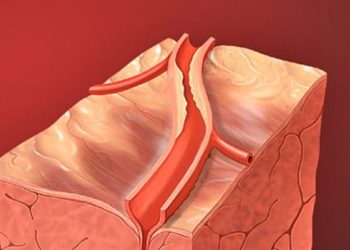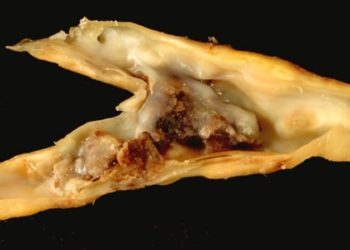#VisualAbstract: Evinacumab demonstrates efficacy for homozygous familial hypercholesterolemia
1. Evinacumab significantly lowered low-density lipoprotein (LDL) cholesterol levels in patients with homozygous familial hypercholesterolemia.
2. Patients receiving evinacumab did not demonstrate additional serious adverse events compared to the control group.
Evidence Rating Level: 1 (Excellent)
Study Rundown: Homozygous familial hypercholesterolemia occurs due to a loss-of-function variant in the low-density lipoprotein (LDL) receptor resulting in low hepatic clearance of LDL cholesterol from the circulation. Patient with the disease have an increased risk of premature atherosclerotic cardiovascular disease. Current treatment options include multiple lipid-lowering drugs and LDL apheresis. However, the interventions are often ineffective in reaching guideline-recommended LDL levels. Therefore, a human monoclonal antibody called evinacumab has been developed to inhibit angiopoietin-like 3, which increases the levels of triglycerides and other lipids. This study evaluated the efficacy and safety of evinacumab in patients with homozygous familial hypercholesterolemia. The results of the study demonstrated that evinacumab significantly lowered LDL cholesterol levels compared to the placebo group. This randomized trial was limited by its short treatment duration, which was not sufficient to determine its long-term safety and cardiovascular outcomes.
Click to read the study in NEJM
Relevant Reading: Inhibition of angiopoietin-like protein 3 with a monoclonal antibody reduces triglycerides in hypertriglyceridemia
In-Depth [randomized controlled trial]: This phase 2, open-label, randomized control trial enrolled 65 participants in a multicenter study at 30 sites in 11 countries. Participants included in the study were 12 years of age or older with at least a 70 milligram per deciliter LDL cholesterol level. Participants presenting with side effects from lipid-lowering therapy were excluded from this study. Patients were randomized in a 2:1 ratio to receive intravenous infusions of evinacumab or placebo treatments, respectively. The primary outcome was the percentage change in LDL level from baseline to week 24. At the end of the follow-up period, participants in the evinacumab group had a 47.1% reduction in LDL cholesterol levels from baseline compared to a 1.9% increase in the control group (between-group least-squares mean difference, -49.0 percentage points; 95% confidence interval [CI] , -65.0 to -33.1; P<0.001). Furthermore, the participants in the evinacumab group had significantly lower levels of apolipoprotein B group (between-group least-squares mean difference, -36.9 percentage points; 95% CI, -48.6 to -25.2; P<0.001), non-HDL cholesterol (between-group least-squares mean difference, -51.7 percentage points; 95% CI, -64.8 to -38.5; P<0.001), and total cholesterol (between-group least-squares mean difference, -48.4 percentage points; 95% CI, -58.7 to -38.1; P<0.001) compared to the placebo group. Finally, adverse events occurred in 66% of the participants in the evinacumab group compared to 81% of the participants in the control group. The study reported an increase in alanine or aspartate aminotransferase for 5% of the participants in the evinacumab group compared to 10% of the participants in the control group. Overall, none of the participants met the criteria for drug-induced liver injury. Taken together, evinacumab significantly lowered LDL cholesterol levels in patients with homozygous familial hypercholesterolemia without increasing adverse event rates.
©2020 2 Minute Medicine, Inc. All rights reserved. No works may be reproduced without expressed written consent from 2 Minute Medicine, Inc. Inquire about licensing here. No article should be construed as medical advice and is not intended as such by the authors or by 2 Minute Medicine, Inc.



![Ivabradine ineffective in stable coronary artery disease [SIGNIFY trial]](https://www.2minutemedicine.com/wp-content/uploads/2014/09/800px-RCA_atherosclerosis-350x250.jpg)



